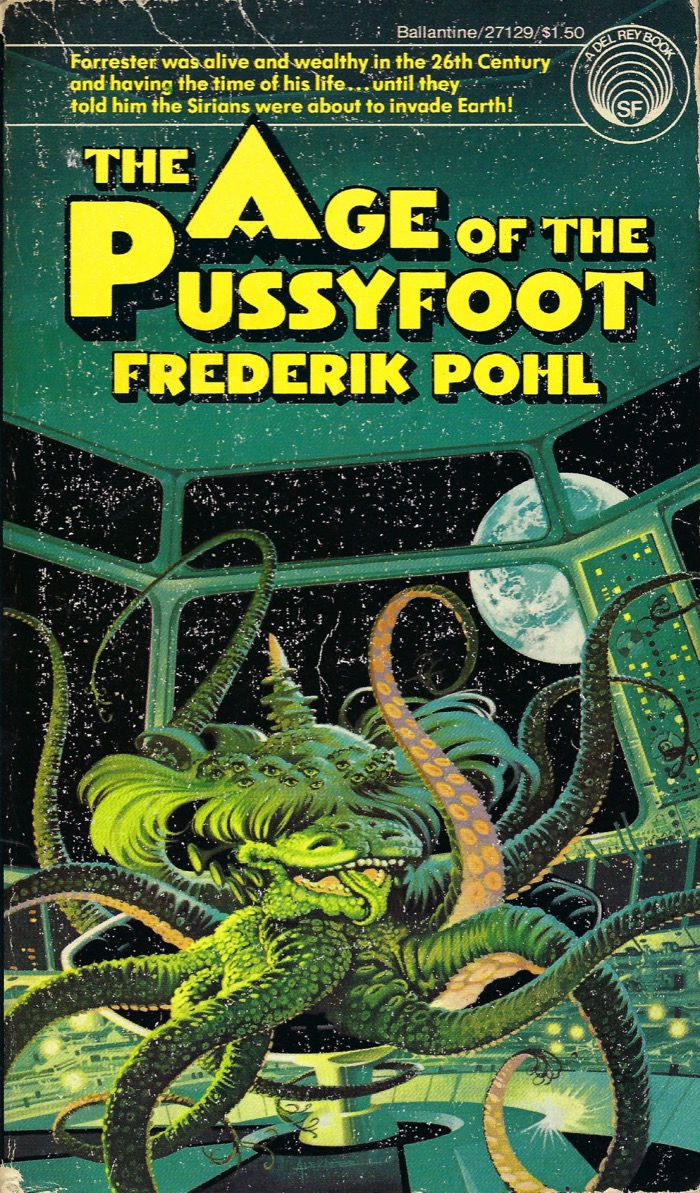The Age of the Pussyfoot
Reviewed date: 2024 Aug 29
Rating: 2
212 pages
If I Were a Rich Man
Charles Forrester died in 1969, was frozen, then revived and restored to health in 2527. He emerges a new man, unencumbered by the past, with no responsibilities, and a whole new world to enjoy. And what's more, he's rich.
It's all been done before
I've read The Age of the Pussyfoot before, it turns out. I don't recall the title or the cover art so I suspect I read it as part of Bipohl where it was printed in one volume with another Pol story, Drunkard's Walk. I have distinct memories of the scene where the main character discovers he is not, in fact, rich: he's been revived after centuries of cryosleep, his assets have appreciated significantly and he's worth a quarter of a million dollars, but that's not a lot anymore. I also recall vividly when he discovers it's not because of inflation. A quarter million dollars is worth the same in the 26th century as it was in the 20th, it's just that lifestyles have gotten more expensive. I didn't quite buy that at the time—five hundred years with zero inflation? That strains credulity—but I did (and do) take the point that lifestyle inflation is a real thing. We expect more, and that costs more.
Joymaker = smartphone + AI assistant
The most interesting bit of future technology that Pohl includes in The Age of the Pussyfoot is the joymaker. It's a wand-shaped device that connects wirelessly to a central computer, through which a person can talk to an artificial intelligence assistant. People use the joymaker to request information, order food, buy and sell products, make phone calls, send voicemail messages, seek employment—basically anything and everything in 26th century life goes through the joymaker.
The joymaker is a smartphone and AI assistant. Interestingly, Pohl didn't foresee a need for a screen, so the joymaker's interface is entirely audio. Also interestingly, the joymaker has built-in functionality for dispensing medication and drugs, so, you know, it can cure a headache or give you a little LSD pick-me-up.
The AI is pretty advanced even by 2024 standards, although with some of these large language models we're getting closer to what Pohl envisioned.
Forced incompetence as a plot device
With the joymaker to guide him, Forrester should have plenty of help navigating the 26th century world. In a convenient plot device, Forrester is habitually impatient with the joymaker and rarely gets any useful information from it. When he asks a question and doesn't immediately understand the answer, he declares the joymaker to be inscrutable and useless rather than asking any clarifying questions. When the joymaker prompts him to listen to important incoming messages, Forrester yells at it to keep quiet and stop bothering him. This allows Pohl to gradually reveal the true nature of 26th century society, which is clever writing but it is also infuriating. Forrester is comically, deliberately, incompetent. Pohl forces him to act this way because it's necessary for the structure of the storytelling, but it makes no sense. By all accounts Forrester is a typical 20th century man. He should be able to ask some smart questions and figure out what's going on. Instead, he continually refuses to see what the joymaker and all his friends are trying to tell him, he's always in trouble and two steps behind, and he makes rash and snap decisions instead of asking for advice. It's perhaps believable the first time he does this. It's less so the second, third, fourth, fifth, and dozenth time. Unfortunately it's necessary for the plot.
Oh, there's a plot
Sure, there's a plot. Forrester meets a woman named Adne Benson and starts a relationship, which leads to all sorts of 20th-century-man-meets-26th-century-girl culture clashes and misunderstandings. Forrester inadvertently angers a Martian who then takes out a murder contract on him, so he has to dodge assassination attempts. He spends all his money and has to take a job working for a Sirian prisoner, which is socially frowned-upon because Earth is at war with the Sirians. When he loses that job, he ends up penniless and living on the streets with the Forgotten Men who don't have access to joymakers and make a living through begging and bartering. Finally, Forrester accidentally helps his former Sirian employer to escape from Earth and return to Sirius, which is bad because Earth's location has been kept a secret until now. Being hidden is all that's kept Earth safe since the Sirian war began. (That is, since humanity discovered the Sirians and massacred some of them.) Given the impending Sirian attack, most people opt to enter cryosleep and awaken when the threat is gone. With the population in deep sleep, a group of Luddites seizes the opportunity and begins systematically destroying Earth's technology. Forrester manages to stop them, which sort of makes up for his role in helping the Sirian escape. It's not mentioned, but it seems Earth manages to repel the Sirian attack. Forrester lives happily ever after in the 26th century. The end.
